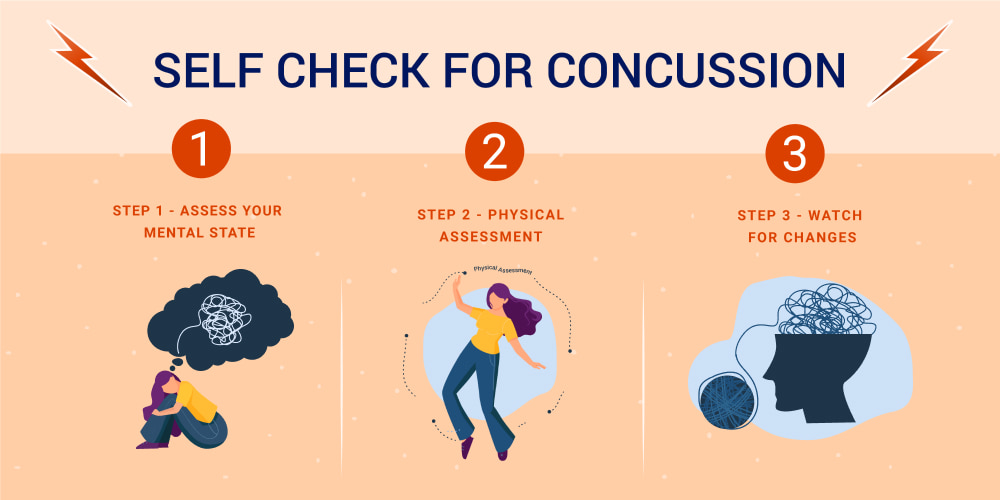Concussions, although frequent, should not be underestimated. They can occur in various scenarios. And can affect anyone from athletes during sports activities to children playing outdoors. But how do I know if I have a concussion? A concussion occurs when your brain experiences a sudden and forceful movement within your skull. While it’s essential to have a healthcare professional provide a definitive diagnosis, recognizing the potential signs and symptoms is the first step to understanding if a concussion might be at play.
Concussions are frequently termed as “invisible injuries”. It’s due to a lack of visible indications like fractures or bleeding. Despite their subtle nature, they carry significant severity. This guide, serving as your concussion checklist, aims to familiarize you with the signs and symptoms to be attentive to. In the upcoming sections, we’ll delve into the crucial symptoms that may signal a concussion. Acquiring knowledge about these signs empowers you to manage your health and support others when necessary.
How Do I Know If I Have a Concussion?
A concussion is a type of brain injury. It occurs when your head experiences a sudden jolt or heavy impact. Concussions can manifest in various ways and can affect individuals differently. Sometimes, these signs take time to be noticeable. That is why it’s crucial to remain vigilant in the hours and days following any injury to the head or a sudden, forceful impact on the body. And you must visit a doctor for a definitive diagnosis if you have concerns. There are signs you can look out for to determine if you may have a concussion. These signs can be categorized into two groups:
Concussion Signs Others May Notice
Concussions don’t just impact your internal sensations. They can also influence how you present yourself to others. In this section, we will delve into the telltale signs that people can use, like a concussion checklist in others. Here are the main of them:
- Disorientation: Those in your vicinity might notice your disarray and confusion. It could be challenging to respond to basic queries or follow a regular conversation.
- Slurred Speech: A significant alteration in your speech, marked by a slow and unclear articulation. It can be a telltale sign that something is amiss.
- Difficulty in Balance: Onlookers may witness your struggle to maintain stability or walk steadily. These unsteady movements can be indicative of a possible concussion.
- Behavioral Changes: There are times when a concussion triggers abrupt shifts in your demeanor. It might lead to heightened agitation, irritability, or emotional fluctuations.
- Loss of Consciousness: A momentary loss of consciousness, even if it lasts just a few seconds. It is a robust indication of a potential concussion. This sign should be addressed and requires immediate attention.
Concussion Signs You May Notice
It’s vital to acknowledge signs of concussion and check within yourself. There are instances when they might not be readily observable to those around you. If you happen to encounter any of these symptoms after a head injury or a substantial impact on your body, it’s of utmost importance to promptly seek medical assistance. Your proactive approach can be the key to ensuring a swift and effective response to a potential concussion.
- Persistent Headache: A frequently encountered symptom. It involves the presence of an enduring and often intense headache that follows the injury.
- Nausea or Vomiting: Experiencing nausea or vomiting is a sign that something might be amiss.
- Memory Challenges: Do you find it hard to recollect the events leading up to the injury or those that transpired afterward? It is a source of concern.
- Light or Noise Sensitivity: A sudden heightened sensitivity to light or noise could indicate a concussion.
- Vision Disturbances: After the injury, you may notice your vision blurred. And sometimes, you can experience double vision. It is another noteworthy sign to be aware of.
Self-Check for Concussion
While recognizing these signs is essential, you can also self-check for a preliminary assessment. This guide provides you with a self-checklist that will be helpful for you and your family. However, it won’t replace professional medical advice.
But, it can assist you in determining whether you should promptly seek medical care or monitor your condition. Keep in mind that obtaining a timely diagnosis and appropriate treatment is essential. It can help to secure a complete recovery and minimize the risk of potential complications. And whether you should seek immediate medical attention. So, “How do I know if I have a concussion?”. Here are the steps:
Step 1 – Assess Your Mental State
- Assess for Confusion: Self-examination is key. Pose simple questions to yourself, such as your name, the date, and your current location. If you encounter difficulty in responding or experience confusion, this serves as a notable indication.
- Recall the Sequence of Events: Try to recollect the events that transpired before the injury and in the aftermath. Should you encounter memory lapses or find gaps in your recollection, it should prompt heightened concern.
Step 2 – Physical Assessment
- Inspect Your Head: Be vigilant in examining your head for any signs of bumps, bruises, or injuries in the region where the impact occurred. This rapid self-check for a possible concussion can provide insights into the intensity of the impact.
- Track Your Symptoms: Maintain a watchful eye on any symptoms you may experience, such as headaches, nausea, or visual disturbances. If these symptoms endure or intensify, it’s a clear signal that seeking medical assistance is necessary.
Step 3 – Watch for Changes
- Monitor Changes Over Time: Concussion symptoms may not always manifest immediately. It’s important to keep a vigilant eye on your condition over the subsequent hours or even days.
- Rely on Your Intuition: If something doesn’t seem right or your condition shows signs of deterioration, do not hesitate to contact a healthcare professional. Your instincts can often guide you to the right action to ensure your well-being.
Keep in mind that this concussion check serves as an initial evaluation tool. It should not substitute professional medical guidance. Your well-being holds top priority. Obtaining a timely diagnosis and the appropriate treatment is essential. You should have a complete recovery and avert potential complications. Your proactive stance in safeguarding your health is praiseworthy.
Conclusion
In summary, it’s crucial to understand that concussions are significant injuries that must always be treated seriously. The concussion checklist and self-check can provide initial guidance. But it’s crucial to consult a medical expert if you suspect it. Receiving a timely diagnosis and appropriate treatment is crucial. It is an integral part of a recovery to avoid potential complications.
FAQ
What does a concussion feel like?
A concussion can feel different for each person. However, common symptoms include headaches, confusion, dizziness, and sensitivity to light or noise.
How to check if I have a concussion?
To check if you have a concussion, look for common signs. They include headaches, nausea, memory problems, sensitivity to light or noise, or blurred vision. If you experience these symptoms after a head injury, it’s essential to seek medical evaluation for a definitive diagnosis.
How soon after a head injury should I perform a concussion check?
Immediately after any head injury, it’s essential to monitor symptoms. If in doubt, always seek medical attention.
Can I use the concussion checklist for someone else?
Yes, you can use the checklist to assess someone else’s condition. But always consult a medical professional for a definitive diagnosis.












Please, leave your review
Write a comment: